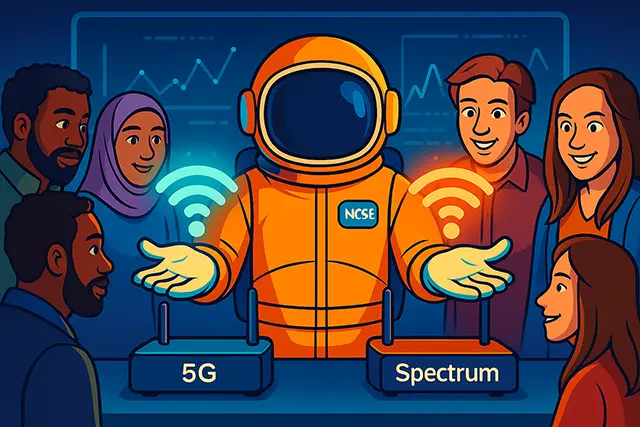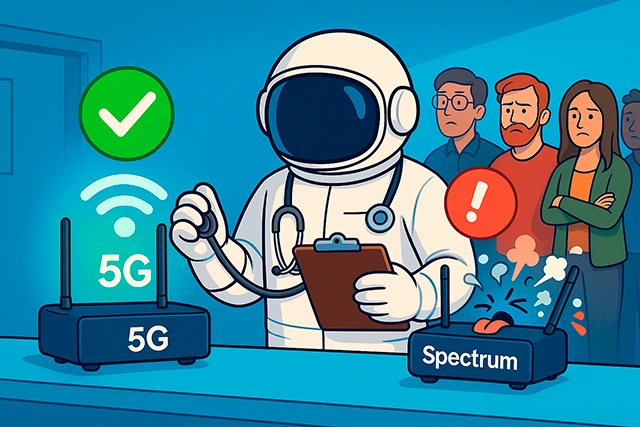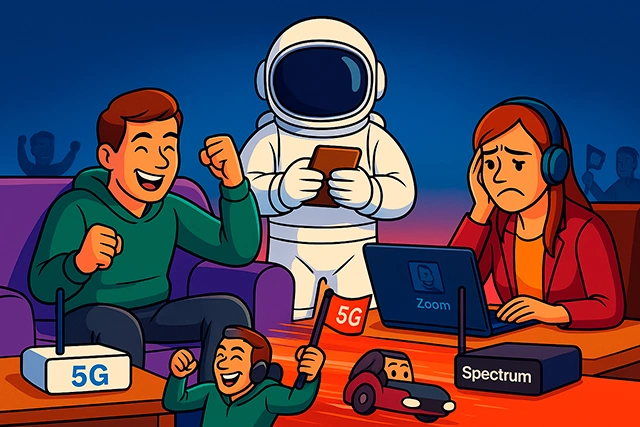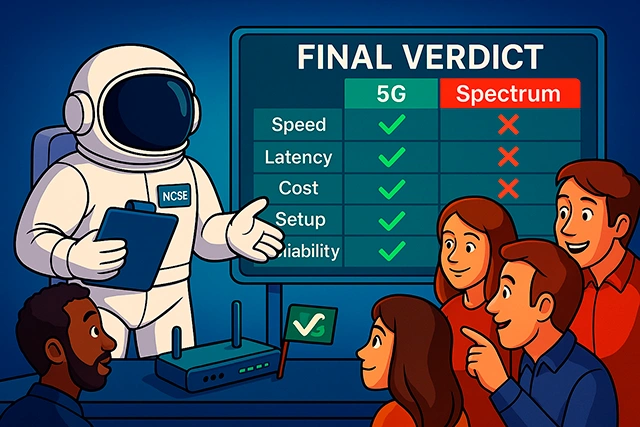Sick of Slow Wi-Fi? 5G Internet vs Spectrum Could Be Your Answer

Ever sat down for your evening Netflix binge only to face endless buffering and lag? Or maybe your Zoom call freezes at exactly the wrong moment again. If you’re tired of Spectrum’s unpredictable cable internet and its sneaky hidden fees, you’re definitely not alone. Across the US, homeowners are increasingly ditching traditional providers like Spectrum and looking toward modern alternatives, especially 5G home internet.
But is 5G internet really the answer to your Wi-Fi frustrations? With providers like T-Mobile and Verizon rolling out affordable, unlimited-data packages, switching from Spectrum to 5G might seem tempting. Still, you might wonder: is 5G internet reliable enough for streaming, gaming, or remote work in America?
In this guide, we’ll break down everything you need to know about 5G internet vs Spectrum, comparing speeds, reliability, costs, and more so you can finally decide if making the switch is worth it in 2025.
Table of Contents
What is 5G Home Internet and How Does It Work in the US?
5G home internet isn’t your typical Wi-Fi setup it’s wireless internet delivered directly through high-speed 5G cellular networks. Unlike Spectrum’s cable internet, which uses coaxial cables running into your home, 5G home internet requires no physical wires or complicated installations.
In the United States, providers like T-Mobile and Verizon use strategically placed 5G towers to transmit high-speed internet signals directly to homes. These providers offer easy-to-install equipment typically a compact wireless gateway or router that connects instantly to the nearest 5G tower, providing fast and reliable internet without the hassle of scheduling technician visits.
This technology particularly shines in urban and suburban areas across America, where strong 5G coverage makes it an appealing alternative for anyone tired of dealing with cable company contracts, hidden fees, or data caps. Whether you’re in a city apartment or suburban home, 5G home internet might be the simple, hassle-free solution you’re looking for.
Spectrum Internet: What Are You Really Paying For?
Spectrum, operated by Charter Communications, is one of the largest cable internet providers in the United States, serving millions of households nationwide. While Spectrum promises fast download speeds and extensive coverage, the experience often comes with surprises particularly when it comes to cost and service transparency.
Initially, Spectrum’s promotional packages may seem attractive, offering plans starting around $49.99 per month. However, many US-based customers find themselves paying significantly more due to hidden fees, modem rentals, taxes, and surcharges that quickly inflate monthly bills. Additionally, Spectrum typically requires professional installation, which can introduce delays or additional one-time fees.
Beyond cost concerns, Spectrum’s internet service relies on coaxial cables, meaning speeds can fluctuate during peak hours, affecting streaming quality, gaming latency, and overall reliability. If you’ve noticed your Spectrum Wi-Fi slowing down when your neighbors get home, it’s because cable bandwidth is shared within your neighborhood, unlike the dedicated signals provided by 5G home internet.
Before you commit or renew your Spectrum contract, it’s crucial to understand exactly what you’re paying for and if the service genuinely meets your household’s internet needs.

Speed Test Results: 5G Internet vs Spectrum in Major US Cities
When it comes to home internet, speed is everything. But how do 5G home internet and Spectrum stack up in real-world scenarios across major US cities? Here’s a quick breakdown based on recent data from independent speed tests conducted in key urban areas like New York, Los Angeles, Dallas, Chicago, and Miami.
T-Mobile 5G Home Internet typically delivers download speeds ranging from 100 Mbps to over 500 Mbps, with peak speeds often exceeding expectations especially in urban neighborhoods with strong tower coverage. Upload speeds usually range between 20 Mbps to 80 Mbps, ideal for streaming, gaming, and working remotely without interruptions.
On the other hand, Spectrum Internet promises high download speeds of up to 940 Mbps on its top-tier gigabit plan. However, real-world performance often falls short during peak evening hours, dropping significantly to around 100 Mbps to 300 Mbps due to network congestion, particularly in densely populated cities. Upload speeds are generally capped much lower usually around 10 Mbps to 35 Mbps, limiting its performance for heavy upload tasks like video conferencing or large file transfers.
If you regularly stream Netflix in 4K, host Zoom meetings, or play latency-sensitive online games, 5G home internet’s stable and consistent speeds may offer a noticeable improvement over Spectrum’s fluctuating performance, particularly in metropolitan areas throughout the US.
Pricing Breakdown: Spectrum vs 5G Home Internet Plans (2025)
Cost is often the deciding factor when comparing internet providers, and it’s no different for households across America considering Spectrum versus 5G home internet.
Spectrum advertises tempting introductory rates, typically around $49.99 to $69.99 per month for standard plans. However, these initial prices frequently rise sharply after the first year. Many subscribers also discover additional monthly charges modem rentals, regional sports fees, and taxes that push actual bills closer to $80–$100 per month, depending on location and service package.
In contrast, leading 5G home internet providers like T-Mobile and Verizon offer straightforward pricing without hidden fees:
- T-Mobile 5G Home Internet: Flat rate around $50 per month, taxes and equipment included, no data caps or long-term contracts.
- Verizon 5G Home Internet: Typically priced from $60 to $80 per month (depending on speed tier), with options to bundle cellular services for further savings.
Notably, both providers waive technician fees since installation is usually self-managed. The transparent pricing model of 5G internet providers makes it easier for US consumers to budget, eliminating bill surprises common with traditional cable providers like Spectrum.
If predictable monthly expenses matter to you, choosing 5G home internet could save you money and stress compared to Spectrum’s less transparent billing practices.

Gaming, Streaming & Work From Home: Who Performs Better?
For many US households, the real test of internet quality isn’t just raw speed it’s about consistent performance during intensive online activities like gaming, streaming Netflix in 4K, or attending remote Zoom meetings.
Gaming Performance (Latency & Ping)
Gamers across America know the importance of low latency and ping. Spectrum Internet, being a cable-based service, typically delivers ping times around 20–50 milliseconds, but can spike dramatically during peak hours due to shared neighborhood bandwidth. This inconsistency may frustrate gamers sensitive to latency spikes.
In contrast, 5G home internet, especially from providers like T-Mobile, offers relatively stable ping times averaging 15-40 milliseconds. While slightly variable depending on location, these latency numbers often provide a smoother gaming experience, particularly in major urban areas.
Streaming Quality (Netflix, YouTube, Hulu)
When streaming your favorite shows, consistency matters. Spectrum’s internet speeds are generally sufficient for streaming HD or even 4K content however, bandwidth congestion during evening hours often results in buffering, reducing the quality of your streaming experience.
On the other hand, 5G home internet generally offers a smoother, buffering-free streaming experience thanks to its dedicated cellular signal making it particularly attractive for binge-watchers tired of Spectrum’s evening slowdowns.
Working From Home (Zoom Calls & Upload Speeds)
For remote work, upload speeds and connection stability are crucial. Spectrum often caps upload speeds significantly, averaging around 10-35 Mbps, making large file transfers and multiple simultaneous video calls challenging.
Meanwhile, 5G internet providers consistently deliver higher upload speeds 20-80 Mbps, making remote tasks like video conferencing, cloud-based collaboration, and uploading large files far more seamless and reliable.
If gaming, streaming, or working from home is part of your daily routine, switching to 5G home internet could significantly enhance your online experience compared to the unpredictability of Spectrum’s cable-based service.
Installation & Customer Service: 5G vs Spectrum
Getting online quickly and staying online without headaches is essential for most American households. Here’s how Spectrum and 5G internet providers compare in terms of installation simplicity and customer support.
Installation Process
Spectrum Internet usually requires a professional technician visit to your home. This means scheduling appointments, potentially waiting days or even weeks, and sometimes incurring installation fees averaging around $49 to $99. While Spectrum offers self-installation kits, they’re not always straightforward, and you may still need technical support if something goes wrong.
In contrast, setting up 5G home internet such as T-Mobile or Verizon solutions is extremely user-friendly and self-service oriented. Your provider typically ships a ready-to-go 5G gateway directly to your home. Simply plug in the provided router, follow straightforward app-based instructions, and your household Wi-Fi is ready in minutes, with no waiting around for technicians.
Customer Support & Reliability
Customer service experiences with Spectrum are mixed while phone and online support are widely available, long hold times and repetitive troubleshooting steps are common pain points cited by many US customers. Issues like billing disputes, outages, and intermittent slowdowns can result in frustrating interactions.
On the flip side, 5G providers like T-Mobile and Verizon have invested heavily in customer-friendly digital support platforms, including intuitive apps and responsive chat services. Additionally, since the technology is wireless, common cable-related problems like outages due to line damage or weather-related issues are generally fewer, resulting in fewer customer support calls overall.
If quick setup, minimal technical issues, and responsive customer care matter to you, 5G home internet offers clear advantages over Spectrum’s traditional cable service.
Availability Across the US
While both Spectrum and 5G home internet promise fast and reliable connectivity, availability greatly impacts which service is best for your specific needs. Let’s explore how widespread each option is throughout the United States.
Spectrum Coverage in the US
Spectrum, as one of America’s largest cable internet providers, has extensive availability across urban, suburban, and many rural regions. If you live in metropolitan areas, suburban neighborhoods, or even smaller cities, Spectrum likely offers reliable access to broadband internet. However, rural areas or small towns may experience limited infrastructure, slower speeds, or increased reliability issues.
5G Home Internet Coverage (T-Mobile & Verizon)
5G internet providers are rapidly expanding their reach, with T-Mobile and Verizon leading the charge. As of 2025, major US cities like New York, Los Angeles, Dallas, Miami, Chicago, Atlanta, and Seattle boast strong, reliable 5G coverage, making it an ideal option for urban and suburban residents looking to break free from cable companies.
However, in smaller towns or rural areas, 5G coverage can still be spotty or in early deployment stages. While expansion efforts are ongoing, availability may vary significantly, making it important to verify coverage directly with the providers before committing to service.
Ultimately, your choice between Spectrum and 5G home internet may depend heavily on your location within the US. Urban residents will find 5G highly attractive and readily available, while many rural households may still rely on traditional cable solutions like Spectrum until 5G expands further.

Should You Switch to 5G Internet in 2025?
Deciding whether to switch from Spectrum to 5G home internet depends heavily on your household’s internet usage, budget, location, and the specific features you prioritize. Let’s break down who might benefit the most from each type of service:
When 5G Internet Makes Sense:
- Urban & Suburban Households: If you’re living in major cities or suburban areas with solid 5G tower coverage (e.g., New York, LA, Dallas, Seattle), switching can provide you with faster, more consistent internet.
- Budget-Conscious Users: With providers like T-Mobile offering flat monthly rates around $50 without hidden fees, 5G home internet can significantly reduce your monthly bills compared to Spectrum.
- Remote Workers & Gamers: If your daily activities demand low latency, high upload speeds, and consistent performance like frequent video conferencing, gaming, or content creation 5G home internet will likely deliver a superior experience.
When Staying with Spectrum Might Be Better:
- Rural Areas with Limited 5G Coverage: If you’re located in areas where 5G towers are scarce or not fully deployed yet, Spectrum’s existing cable infrastructure might remain your most reliable choice.
- Heavy Users in Large Families: For large households simultaneously streaming, gaming, or downloading, Spectrum’s higher bandwidth potential (when not congested) can be beneficial, especially if you’re willing to pay for their premium plans.
- Existing Contract Constraints: If you’re locked into a long-term contract or bundle deal with Spectrum, it might be financially smarter to wait until your term ends before considering a switch.
Considering these scenarios carefully will help you determine whether transitioning to 5G home internet makes practical and financial sense for your home in 2025.
FAQ: Common Questions About Switching from Spectrum to 5G Internet
To help you confidently make the switch, here are answers to some common questions Americans typically ask about transitioning from Spectrum cable internet to 5G home internet:
1. Is 5G home internet reliable during storms or outages?
Yes. Since 5G home internet operates wirelessly via cellular towers, it’s typically less susceptible to outages caused by damaged cables or fallen lines, making it generally reliable even during storms or adverse weather conditions.
2. Does 5G internet support smart home devices?
Absolutely. 5G internet seamlessly supports smart home devices such as smart TVs, security cameras, thermostats, and voice assistants with plenty of bandwidth and consistently low latency.
3. Can I keep my old Wi-Fi router with 5G internet?
In most cases, providers like T-Mobile or Verizon supply a dedicated 5G gateway device that combines the modem and Wi-Fi router into one. However, you can usually connect your existing Wi-Fi router to this gateway if you prefer specific router features or coverage improvements.
4. Does 5G home internet have data caps like traditional providers?
No, most leading 5G home internet providers in the US (T-Mobile, Verizon) offer unlimited data without any monthly caps or throttling, making it an excellent choice for heavy streamers or gamers.
5. Can I easily switch from Spectrum to 5G without downtime?
Yes. Since 5G home internet uses separate wireless infrastructure, you can activate it alongside your existing Spectrum connection. Once it’s up and running, simply cancel Spectrum to avoid any downtime.
By understanding these points clearly, you can confidently determine whether transitioning to 5G home internet is the right choice for your home and lifestyle in 2025.

Final Verdict: Spectrum vs 5G Home Internet (Comparison Table)
To make your decision easier, here’s a quick side-by-side comparison highlighting key differences between Spectrum and 5G home internet:
| Feature | Spectrum Internet | 5G Home Internet (T-Mobile/Verizon) |
|---|---|---|
| Average Speed | 100–500 Mbps (varies by congestion) | 100–500+ Mbps (more consistent) |
| Upload Speed | 10–35 Mbps (limited) | 20–80 Mbps (higher and more reliable) |
| Latency (Ping) | 20–50 ms (less consistent) | 15–40 ms (more stable) |
| Monthly Cost | $49–$99+ (after fees & promos end) | $50–$80 flat rate (no hidden fees) |
| Installation | Technician visit, potential extra fees | DIY installation, no technician required |
| Data Caps | Usually none | None |
| Coverage in US | Widespread but varies by region | Expanding rapidly strongest in urban areas |
| Reliability | Good, but congestion during peak hours | Generally more reliable due to dedicated signals |
| Customer Service | Mixed can experience long wait times | Generally more responsive, better support |
Our Recommendation:
If you’re an urban or suburban resident looking for transparent pricing, easy setup, and stable performance, 5G home internet is likely your best bet in 2025. Spectrum, meanwhile, remains suitable for rural locations or large households still underserved by 5G infrastructure.
Choose according to your priorities, but if you’re truly sick of slow Wi-Fi and hidden fees, 5G home internet could be exactly the upgrade you need.







